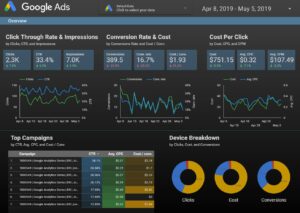
It’s time to discuss an industry staple – KPIs. In today’s competitive landscape, if success is not measurable, it is difficult to call it a true success. Even if you think your website is perfectly crafted and looks stunning, is it really delivering any tangible results?
One of the most useful measurement tools is the Key Performance Indicator (KPI). Though it’s vital that you choose the proper KPIs if you want to get the best results. Before determining KPIs, make sure you answer some key questions.
Three Questions to Establish Your KPIs
Is It Aligned With Your Goals & Objectives?
First, you should have a purpose for a new campaign or effort – an ultimate goal like raising awareness or improving sales. Then, you need to track the progress towards your goal with measurable, applicable data. In come KPIs!
For example, if your goal is sales, then your KPIs most likely shouldn’t be measuring reputation metrics (although it won’t hurt). It is imperative that our KPI aligns with the overall campaign goal. So we can ensure when we look at the dashboard with pride and accomplishment at the end of the day.
Does It Actually Measure Success?
A.K.A. Does the KPI you’re measuring truly matter to the bottom line?
It’s easy to check out your monthly analytics report and take it at face value. Many of us see positive green arrows or negative red arrows and make assumptions from there. However, we often mistake basic metrics for KPIs. A metric is a standard of measurement that we use to monitor trends and the trajectory of our efforts. They do not necessarily tell us if our campaigns are successful or not.
KPIs are directly associated with business outcomes and will allow us to answer that key question, “Were we successful?”
For example, let’s say one of your goals is to improve recruitment numbers. We may then track the user’s journey from initial awareness (social media or ad metrics). Then to consideration (website visitation and pathways). Then to conversion (job applications or form submissions).
By tracking changes to the metrics over a period of time/throughout campaign changes, we can understand what was successful and what wasn’t.
How Will I Measure It?
You may not know exactly what you need to track. The challenging part can be finding the data to effectively measure and report on that KPI. One question we need to ask ourselves is, “Do we have data to actually measure that KPI?” At Wilderness, we prefer the Google products like Google Analytics, Google Tag Manager, and Google Search Console. However, there is a multitude of other competent tools available.
Additionally, make sure the metrics you want to track are quantifiable. Develop a strategy for unique cases where digital tracking may not be an option.
Types of KPIs
KPI’s can provide a variety of insights, rather than just simply tracking sales. You can:
- Measure Process Efficiency: When KPIs are applied to business processes, companies can more easily identify bottlenecks and make resource decisions to improve efficiency.
- Monitor Company Health: KPIs can be grouped in a variety of ways — organizational or operational, leading or lagging, and by the customer, financials, growth or process. When monitored in sync, these unique insights can help change along.
- Identify Problems to Solve: KPI analysis can uncover an issue that might otherwise go undetected, like a high bounce rate or a dramatic decrease in form submissions.
- Measure Progress: Like we discussed in the previous section, KPIs, by their very definition, measure progress on a company’s key business objectives.
- Adjust Goals and Targets: By monitoring KPIs often, even daily, a company may realize a goal or objective is unrealistic or no longer aligned with the business’s current life stage.
- Analyze Patterns: When KPIs are measured over time, patterns and trends often emerge that can inform better decision-making.
Talk to the KPI Experts
Analytics and reporting are critical business intelligence tools, but only as long you’re looking at the RIGHT data and KNOW what to do with it. Anyone can look at a graph trending upwards and think, “Sure, that looks good to me!” But we’ve been around the block enough to know that looks can be deceiving.
We foster growth for our clients by aligning KPIs with concrete business objectives, and we tailor our reports to show impact and inform future decisions. Contact us today to get help achieving your business objectives!






